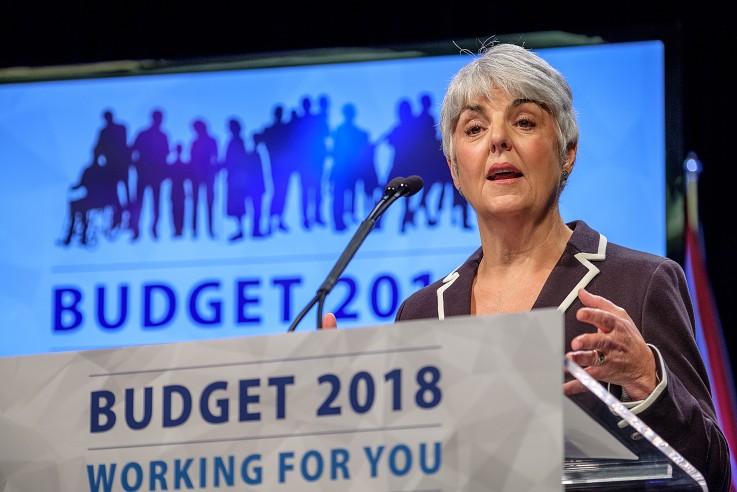Give Finance Minister Carole James full marks for a bold budget approach and the skill to sell it.
The new government was in a tough spot. It had lots of campaign promises to deliver, and no money because of the BC Liberals’ reckless decision to halve MSP premiums without any plan to replace the revenue.
Conventional wisdom has been that tax increases of any kind would bring all kinds of abuse. So far, the budget reaction is proving conventional wisdom wrong.
The big tax item is a new payroll tax to replace MSP premiums entirely by 2020 and bring in $1.9 billion a year when fully implemented. Businesses with less than $500,000 in payroll — say a half-dozen employees — will be exempt. Those with $1.5 million or more will pay tax equal to 1.95 per cent of payroll.
It’s a big new tax; corporate income tax, for example, is only expected to bring in $4.1 billion this year.
But while business groups aren’t happy, they haven’t taken to the barricades. The Greater Vancouver Board of Trade still gave the balanced budget a C-plus rating.
Partly, that’s because larger businesses know they got a windfall when the BC Liberals halved MSP premiums. About 40 per cent of premiums had been paid by businesses on behalf of their employees, either as company policy or as a result of a union contract. When the Liberals cut the premiums, the companies saved money. Now they will pay a new tax in its place.
And partly, businesses knew some form of payroll tax was coming to make up for MSP premiums. The government set up an MSP task force to consult widely and come up with a proposal on replacing the revenue. The three-person panel’s interim report, delivered Feb. 1, suggested it was heading to a recommendation that the money be raised through a payroll tax and personal income tax increases, in roughly equal proportions.
It was a bit of a slap to make the decision before the group had completed its work, both to the members and the 1,500 people and organizations that made submissions on how the money should be raised. “This is not the direction we were going,” tweeted task force chair Lindsay Tedds, a University of Victoria professor.
Still, the business community knew a payroll tax would cover a significant portion of the costs.
The other tax measures are less dramatic, though the government forecasts that property tax changes, including measures to curb speculation, will bring in $521 million once fully implemented in the next fiscal year.
And the $5 annual increase in the carbon tax for the each of the next four years will bring in an additional $726 million a year by 2020/21.
All in, revenue is forecast to be $58.7 billion in 2020/21, up $6.6 billion from this year — about 12.6 per cent.
That’s not out of line with population and GDP growth, and it gives the government room to deliver on some of its campaign promises around child care, housing and better conditions for seniors in residential care.
The health budget, for example, is slated to increase 4.5 per cent this year and 4.4 per cent in the following year, largely to support improvements to seniors care. Those are badly needed. The former government’s inaction meant 85 per cent of B.C. seniors’ residences fail to meet minimum provincial staffing guidelines, a shameful betrayal of a whole generation.
The ministries of children and families and social development and poverty reduction also get big increases that should allow the government to address issues neglected by the former government.
And the budget left the government with a lot of room to address other issues. Between the contingency allowance and an account for “Priority spending initiatives and caseload pressures” the government has $2 billion in reserve to spend in 2020/21. (Perhaps not coincidentally, as the next election approaches.)
Based on the first 24 hours of reaction, Premier John Horgan should be pretty happy. The government found a way to raise money to address critical needs and deliver on promises without getting gored for tax increases or running deficits. Its Green party allies are happy.
And the response may indicate a big shift in politics in the province. The Liberals governed for 16 years on the basis that taxes were bad and that British Columbians weren’t willing to pay for services like health care, child care, support for people with disabilities or education. They acknowledged as much in their bizarre pre-defeat throne speech repudiating almost every policy the party had claimed to believe in.
The NDP government’s first real budget offered a very different approach, one that assumed services that made life better were worth paying for. So far, the public seems to agree. ![]()
Read more: BC Politics
















Tyee Commenting Guidelines
Comments that violate guidelines risk being deleted, and violations may result in a temporary or permanent user ban. Maintain the spirit of good conversation to stay in the discussion.
*Please note The Tyee is not a forum for spreading misinformation about COVID-19, denying its existence or minimizing its risk to public health.
Do:
Do not: